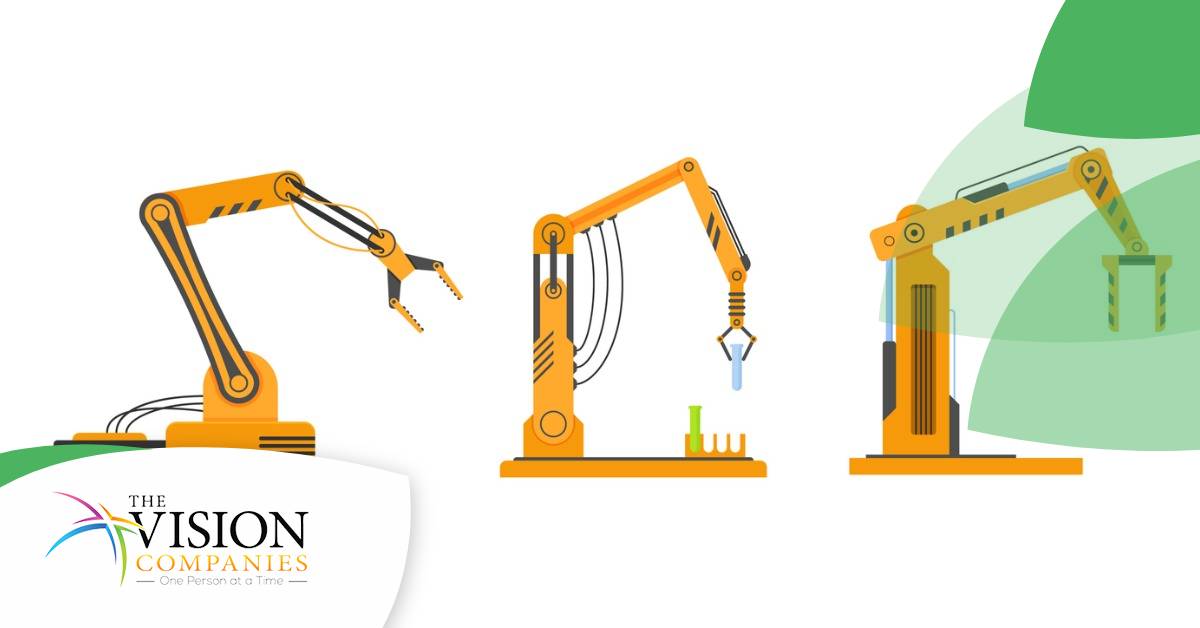
Machine operator jobs, sometimes called machinist jobs, are indispensable parts of the workforce in a variety of industrial settings, including warehouses, construction sites, factories, and more. They use a variety of machinery to complete tasks like manufacturing, assembly, and others.
Becoming a machine operator is a desirable option for several reasons. One, there is a low bar for entry – most positions don’t require an advanced degree, so you can become a machine operator as long as you have a high school diploma or GED equivalent, as well as the proper training. And because the manufacturing industry is robust, machine operators are in demand. As long as materials and goods need produced, machine operators will be needed.
What exactly does a machine operator do, and how can you become one? What kind of skills are necessary to be successful, and what is the job outlook like? Let’s dive into the machine operator profession to answer all these questions and more.
What is a Machine Operator?
Machine operators use machinery to complete tasks like manufacturing, production, assembly, disassembly, and more. Most machine operators specialize in a particular type of machine, like a crane or forklift, although some specialize in the use of multiple types of machines. Light machinery like lathes, mills, saws, and grinders may also be used, as well as small hand tools.
Operators are responsible for the functioning and use of the machine, including equipment set-up, use, and inspection. It’s a machine operator’s responsibility to make note of any malfunctions or abnormalities and let their supervisor know so that the machine can be repaired. In some cases, machine operators complete repairs themselves.
Another important part of the machine operator’s job involves safety. It’s their responsibility to adhere to all safety guidelines outlined by the Occupational Safety and Health Administration (OSHA). This involves using the machine properly and maintaining all equipment as necessary.
What Does a Machine Operator Do?
Machine operators perform a variety of development and operational tasks in a production, manufacturing, construction, or other industrial setting. Common responsibilities and duties found in a machine operator job description include things like:
- Using heavy or non-heavy machinery to complete tasks
- Performing routine inspections of equipment
- Maintaining equipment and machinery as needed
- Troubleshooting equipment issues and repairing if necessary
- Reading and interpreting blueprints, engineering specifications, and other documents
- Loading or unloading materials and moving materials around a job site
- Documenting product information and making entries in a computer
- Communicating with other crew members and supervisors about tasks and projects
- Maintaining a clean, secure, and safe work area
- Training junior machine operators or entry-level operators
How to Become a Heavy Machine Operator
As mentioned above, the educational requirements to become a machine operator are usually minimal. Most employers will require machine operators to have a high school diploma or GED. With that being said, various employers may want candidates to have certification from a technical training program. And some machine operators have college degrees in engineering and other fields. However, these aren’t typically requirements to get started in the field.
Note that on-the-job training will almost certainly be required for machine operators, especially ones with minimal experience. Official safety training that aligns with OSHA standards will also probably be required. On-the-job training and guidance from more experienced operators can help entry-level machine operators learn skills quickly and grow in their careers.
What Types of Skills do Machine Operators Need?
There are a few physical requirements that a good machine operator should have. You’ll need to be able to lift up to 50 pounds, have good hand-eye coordination and motor skills, and have clear vision with or without corrective lenses. Additionally, machine operators need basic mathematical skills and need to be able to interpret and act on schematics. Depending on the job, a machine operator might need experience with CAD/CAM technology – computer-aided design and computer-aided manufacturing tools are used heavily in the field of production and manufacturing.
Depending on where a machine operator works, they may be subjected to loud noises, debris, and various safety hazards like flying objects or high temperatures (although following proper safety protocols will greatly minimize these risks). Some machine operators work outdoors, although most work in climate-controlled buildings.
Aside from these physical and “hard” skills, a variety of soft skills are also important for machine operators to possess. They include:
Attention to Detail
Schematics need to be interpreted precisely to make sure the right parts and products are produced. Machine calibrations must be exact to ensure successful production. Problems must be noticed and acted upon right away so that production is correct and the operator and crew remain safe. For all these reasons and more, attention to detail is an important skill for a machine operator to have. When details aren’t paid attention to, things get missed. And in an industrial environment where details are important for the safety of the operator and crew, this can prove dangerous.
Critical Thinking
The ability to grasp an issue or problem and think critically in order to come up with viable solutions is also important for machine operators. Invariably, machines will break down, and troubleshooting issues like this is a big part of the job. Production lines can’t stop for long without costing companies a lot of money. That’s why critical thinking skills are necessary to get things running again quickly. The best machine operators use their critical thinking to deal with problems quickly and efficiently, bettering the experience for all crew members.
Time Management
Machine operators often work on tight deadlines in order to get tasks completed and certain amounts of products or materials produced. This requires good time management skills, since the operator must stay on-schedule in order to get things accomplished in the time frame. If they don’t, the entire production process could falter. Being able to stay on-task and manage time effectively is an essential skill for any machine operator.
Communication
A machine operator might operate a single machine on their own, but they are by no means an independent worker. Machine operators work as part of a larger manufacturing team or crew. They also frequently receive direction from someone else – a supervisor or a machine programmer, for example – on precise instructions. This is why machine operators need great communication skills; that will help them receive and give instructions, complete tasks on schedule, and maintain production levels.
What is the Schedule of a Machine Operator?
The specific schedule of a machine operator varies depending on the company and the job requirements. Most operators work full-time, or about 40 hours a week. Many work in a shift-work setup, especially machine operators that work in warehouses or factories that are open 24 hours.
First shift hours are usually 9 a.m. to 5 p.m. Second shift is from about 5 p.m. until midnight or 1 a.m. Third shift workers, or overnight, work from midnight or 1 a.m. until 7 or 8 a.m. Third-shift workers are often paid at a higher rate than other shift workers.
How Much Do Machine Operators Make?
The Bureau of Labor Statistics lists the median annual wage for machine operators as $37, 450 in May of 2020. Keep in mind that this is the median, and many machine operators make much more. Of course, a machine operator’s salary will increase as they gain experience and more knowledge in various types of machines.
What is the Career Outlook for Machine Operators?
According to the BLS, employment for machine operators is expected to grow by a rate of 7% between 2020 and 2030. Almost 85,000 jobs are projected to open each year over the decade. This is on-pace with the growth seen in most other sectors of the job market – it’s a stable career choice that also offers plenty of room for growth.
Find a Machine Operator Job in Minneapolis with The Vision Companies Today
Are you looking for machine operator jobs in Minnesota? Whether you’re interested in warehouse machine operator roles or machine operator jobs for construction, manufacturing plants, or other industrial settings, The Vision Companies can help. We’re the area’s leading industrial employment agency, and we help place candidates including machine operators in roles they love.
With offices in Rogers, Minneapolis, Blaine, and St. Paul, we place qualified candidates around the region with top industrial employers. Don’t waste time going through temp agencies in Minneapolis that fail to value your experience, skillset, and determination – we’re Minneapolis, MN’s leading staffing agency because we take a different approach. We’ll put you first and help you advance in your career.
Contact a member of our recruitment team to get started on your job search, and browse our job board to view available openings.










